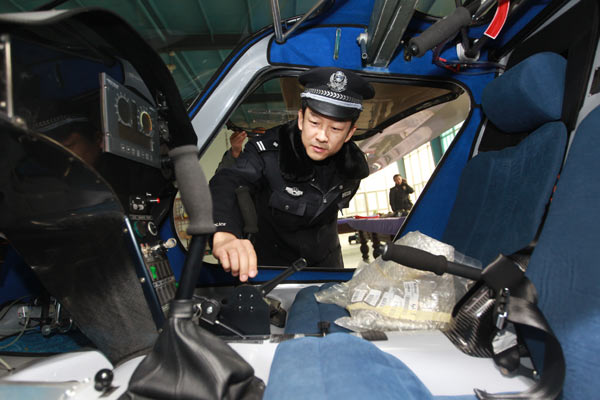No-fly-zone imposed on capital for two sessions
Updated: 2012-03-01 08:01
By Cao yin (China Daily)
|
|||||||||||
BEIJING - Small aircraft will be banned from flying over Beijing for two weeks from this weekend to increase security during the two sessions.
The aircraft, including helicopters, gliders and manned balloons, will be forbidden from flying in the capital's airspace from March 2 to 15, when the National People's Congress and Chinese People's Political Consultative Conference are held.
Announcing the measure on Wednesday, Zuo Baoshuan, deputy director of the management corps with the Beijing municipal public security bureau, said that the 2,134 registered small aircraft in the city cannot be flown within 200 km of Tian'anmen Square during this time.
 |
|
A police officer checks a small aircraft at a club in Beiijing's Changping district on Wednesday. [Cui Meng / China Daily] |
"All private aircraft operators are required to stop flying or training, and various ceremonies or sales promotions that use small aircraft are banned," Zuo said, urging people to call the police if they suspect anyone of contravening the ban.
On Wednesday morning, about 10 police officers went to the country's first private aircraft club, established in 1987 in the city's northern Changping district, and temporarily sealed its hangar.
Zuo also asked the club to remove propellers and engines from their aircraft.
"We have signed an agreement with pilots who leave their private aircraft there, and emptied fuel from the aircraft," said Yang Youming, a spokesman for the club, adding they will put extra security on the hangar.
Previously, small aircraft were also grounded on important holidays, such as National Day, and during the Olympic Games in 2008, Yang said.
Every amateur pilot must gain permission from the national air traffic management department before they can fly, so they do not affect regular commercial flights, Yang said. He added the maximum altitude allowed for amateur flights is 300 meters.
Hu Yingjian, a flying instructor at the club, was dismantling an engine from a small plane when the ban was announced.
"We'll also close our runway in the next two weeks and remove storage batteries from aircraft with electric drives," said Hu, who supports the security measures.
However, Wang Hongjun, director of the public order research office at the Chinese People's Public Security University, said that small aircraft in general needed stricter regulation in the future.
"Some people have big remote-control aircraft, but they haven't registered them with the authorities, and this is a big challenge for government departments to deal with," Wang said.
"Low-altitude flying can bring more danger to pilots and public safety, and the aircraft may also become targets for people with bad intentions," he said.
Today's Top News
President Xi confident in recovery from quake
H7N9 update: 104 cases, 21 deaths
Telecom workers restore links
Coal mine blast kills 18 in Jilin
Intl scholarship puts China on the map
More bird flu patients discharged
Gold loses sheen, but still a safe bet
US 'turns blind eye to human rights'
Hot Topics
Lunar probe , China growth forecasts, Emission rules get tougher, China seen through 'colored lens', International board,
Editor's Picks

|

|

|

|

|

|





